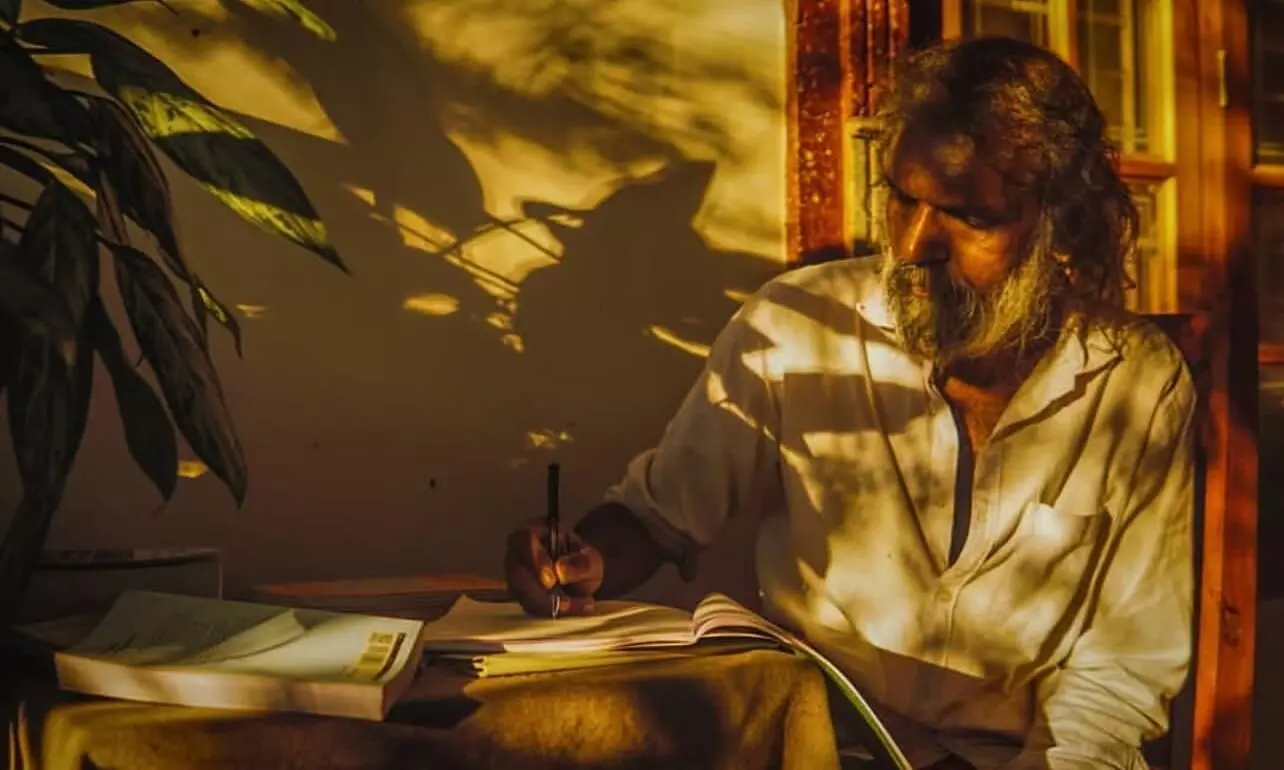
Never die as lonely as this man
text_fieldsPhoto by Viswan Zorba.
Renjith master was silent as usual. Except that he wasn't smiling. That subtle language he was good at was gone---forever. He looked as if he was deeply in meditation; eyes shut, mouth tight, and face cloudy. Was he contemplating what to say next? Thus, he always spoke; no loose talk, no gaffes, and no circumlocution. Everything was just clear and precise—and straight from the heart, too.
His lifeless body looked thinner as it was removed from the ambulance. He was found dead in his house a day later on May 23. Hundreds of his former students, admirers, teachers, writers, artists, and friends poured in at his house in Kapummal, Pinarayi for a last glimpse of him. He touched our lives. Each believed personally closer to him than others. We each had a story about him on our tongues. I had many. I have known him for two decades. A man beside me kept whispering, "What a man! Genuine, and compassionate" He couldn't help throwing more adjectives. A woman burst into tears as she placed flowers at his feet.
E R Renjith was a trained math teacher with a post-graduation in philosophy, who began teaching as a 21-year-old at an elementary school in Kannur. He retired three years ago from the higher secondary school in Orkatteri in the district. Passionate to his calling, Ranjith master spent his life and money on students and schools. To one school he offered a swimming pool, another a land for pedagogical park, still another got something else. He helped the poor students with food and clothes. He chose to work at remote schools, where the poor went to study. He stayed in the school, rough-sleeping on a bench.
His first appearance at any school was an event. A taxi cab would pull up at the village street. Then a lorry bursting with his bedding, kerosene stove, teaching aids, drums, guitar, pipes and tree saplings would arrive in tow. Renjith master would come out, smiling. His long hair kept running like octopus tentacles. At which moment onward students and the villagers, as if under a spell, would follow him. It was like the Pied Piper of Hamelin in action.
His teaching aids, mostly study tools for science, adorned the school hallways and verandas, turning the premises into a festival ground. He taught beneath the trees, when it was still a crazy idea, using drums and pipes for mathematics, and everyday life contexts for philosophy. He would pull up the stakes and move before getting attached to a place. A moving lorry would take away teaching aids and bedding, perhaps to a school on a hilltop. Students would bid him farewell tearfully. At one school all students protested against his leaving. This was how he taught for more than three decades. Besides,he worked with Sastra Sahitya Parishad, and prepared school text books.
His homestead was nearly a Miyawaki forest. He was perhaps the first in Kerala to try the idea of mini- forest by Japanese botanist Akira Miyawaki, Many species of trees, plants, creepers crowd here. Alongside he ran a vegetable garden where plants thrived in barrel-size pots. There is an arbour over the pathway. All kinds of creepers hung from the grillwork up there. He had a botanist surveyed biodiversity around the house, giving each tree its species name card—mostly medicinal and fruit plants. Fruit plants are for birds. "We have to care about birds. They don't get enough to eat", he told me. He placed water in pots around the house for birds and animals and fed ants every day. This was long before feeding animals and birds became a thing among nature lovers. Earth was for him a book to be read, rather than having it torn away.
His house was a school. Groups of students turned up to study science and maths there. A network of expert teachers supported him. They took children to hills for night-sky watching. That was something for village kids. His life was on a roll, learning, teaching, travelling, and writing as well as publishing in education journals. He wrote mostly about philosophy, pedagogy and math. At times he vanished for months into some north Indian states and emerged dishevelled, dusty, matted but radiating with life. Some of these trips ended up in the Himalayas, where he made friends with swamis.
Back in the 1990s, a textile factory was dumping waste into the wetland in his place. Cancer cases were being reported. Nobody noticed the connection, except him. First he tried in vain to talk the factory owner out of it. Then he plunged into Gandhian activism, walking around the village distributing personally printed books about heavy metals. Activists turned up to educate the villagers about pollution. Folksingers, street drama troupes came in. It was a peaceful protest without spreading hate. "The factory owner himself was as ignorant as others" once he told me. The man deigned to stop the dumping.
Here is a visual poem that sums up symbolically the lonely path Renjith master trod all along. He himself rendered the voice-over to the film.
I first met him in 2000. A thin tall man with deep-set eyes, sunken cheeks, and flowing hair looking exactly like Christ appeared at my doorstep—one evening. He bowed with folded hands and spoke softly. I took his bowing for humblebrag—or false humility. Over the years, I noticed he was humble and generous to a fault. He aligned words with actions, intentions with morality, goodness with responsibility, education with truthfulness. He spoke, logically, sensibly and insightfully.
We spent time discussing ideas. I loved his slow drawl, thoughtful expressions. Also, being curious about his bachelorhood, one day I put to him about marriage. He said "I married the woman in me. I don't want to trouble a woman outside". He was a walking bundle of contradictions—a communist but deeply religious in the true sense. The word religion originated from the Latin word "religare", meaning bond; it had some shades of another Latin word "religio" meaning reverence. He practised the exact meaning of both words, connecting his inner to the higher states of being. Buddha, Gandhi, Vivekananda, Prophet Muhammad, Christ, and philosophers Aristotle, Plato, Diogenes, Immanuel Kant, and Karl Marx were his idols. Nothing was farther from his mind than disrespecting faiths. He practised Islam during Ramadan and involved in what he called Christ-style meditation. It was his invention: get to your feet with chin up, eyes shut alongside breathing deeply. I tried this. It was quite dizzying but helped clear my thoughts. Sri Ramakrishna Paramahamsan was his spiritual guide. The idea of practising different religions came from him. One day we discussed Romain Rolland's "The Life of Sri Ramakrishna'. The copy of the book had the cover image of birds flying. Ramakrishna used to faint in ecstasy at the sight of birds in the skies. Was this hysteria of some sort? I asked him. "No. An awakened man is as good as a mad one. There is only a thin line of difference between them. One is elastically aware of the meaning of existence and the other is forgetful but ecstatic" he told me. It was then he began practising zen meditation, sitting still through nights. He was experimenting to achieve the nirvana of Buddha, ecstatic state of Ramakrishna, serenity of Sri Yukteswar Giri, Meera's worshipful love for Krishna, or 17th century Marathi poet Thukaram's devotion. He loved 15th century Indian mystic Kabir for saying truth is with the person on the righteous path. Renjith master was trying to lift himself to be in their club. He didn't have to do much, I thought. But he went on experimenting, taking a leaf from Mahatma Gandhi's experiments with truth. Eating only enough, mostly uncooked vegetables and fruits, he shed weight—precariously, becoming just bones towards his end.
There was a pool of silence in him, unruffled and bottomless. No one could enter there. He was isolating himself while still reaching out to society. It was a difficult balance. During the covid lockdowns, we spent a lot of time together. The drawing room where we sat surrounded by drums and pipes was a mess. On the floor there were stacks of papers of a manuscript he was working on. He would read to me from it. Afterwards, he sat on the floor, legs drawn up in yoga pose, weaving silence.
The book was part about science, part spiritual quest of a teacher but at its core was his journey up until there. He was laying bare his inner conflicts, which he had many. He was contemplating death, or spiritual leap to higher consciousness. They got mixed.
Looking back, I know he was lonelier than I thought. He wanted love, attention, and companions. But he never asked for them. If nobody turned up, he sat in his empty home without complaining. One day I asked him if those Himalayan swamis he personally knew ever appeared to be lonely. "Certainly, they wait with a lit oil lamp in their caves for somebody to come around" That was the first time I fathomed his loneliness. He did not have any visiting relatives; his mother died years before, his brother was away in Mumbai working.
After retirement, he expected to devote entirely to teaching. He received fewer invites for no reason. Covid spoiled his travel plans. He began living more in his head. It was then the seeds of schizophrenia began to sprout, which he took for spiritual awakening. He heard voices; strange visions and delusions flashed. He talked only when he was talked to. A month ago, I visited him with a singer friend of mine. Renjith master sat there crouched on the floor as the singer hit top notes. He gave us fruit juice, and talked to us just a couple of words. I had a gut feeling of something deeply wrong with him. Days later, a friend called me about, saying the worst. He was weeping. A shiver ran down me. Renjith master killed himself by hanging. More details came. He left behind a suicide note, mentioning Arun Shourie's book "Preparing: For death". In death his face came in alignment with his mother's photograph on the wall. Yes, symbolic indeed. I would rather readers didn't romanticise suicide— God is against self-slaughter, Shakespeare said.























